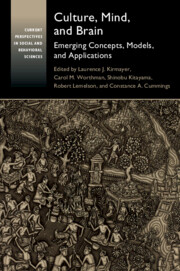Book contents
- Culture, Mind, and Brain
- Current Perspectives in Social and Behavioral Sciences
- Culture, Mind, and Brain
- Copyright page
- Dedication
- Epigraph
- Contents
- Figures
- Tables
- Contributors
- Preface
- Abbreviations
- 1 Introduction
- Part I Dynamics of Culture, Mind, and Brain
- Section 1 The Co-emergence of Culture, Mind, and Brain
- Section 2 The Situated Brain
- Section 3 How Social Coordination and Cooperation are Achieved
- 9 Neuroanthropological Perspectives on Culture, Mind, and Brain
- 10 The Neural Mechanisms Underlying Social Norms
- 11 Ritual and Religion as Social Technologies of Cooperation
- Part II Applications
- Index
- References
10 - The Neural Mechanisms Underlying Social Norms
Norm Detection, Punishment, and Compliance
from Section 3 - How Social Coordination and Cooperation are Achieved
Published online by Cambridge University Press: 18 September 2020
- Culture, Mind, and Brain
- Current Perspectives in Social and Behavioral Sciences
- Culture, Mind, and Brain
- Copyright page
- Dedication
- Epigraph
- Contents
- Figures
- Tables
- Contributors
- Preface
- Abbreviations
- 1 Introduction
- Part I Dynamics of Culture, Mind, and Brain
- Section 1 The Co-emergence of Culture, Mind, and Brain
- Section 2 The Situated Brain
- Section 3 How Social Coordination and Cooperation are Achieved
- 9 Neuroanthropological Perspectives on Culture, Mind, and Brain
- 10 The Neural Mechanisms Underlying Social Norms
- 11 Ritual and Religion as Social Technologies of Cooperation
- Part II Applications
- Index
- References
Summary
Social norms are informal rules for behavior, and are fundamental to all societies. Recently, cultural neuroscience investigating the relation between culture, the brain, and behavior has begun to provide unique insights into the psychological and neural mechanisms underlying social norms and their cultural variations. This chapter offers an integrative review of the literature addressing a number of key questions: Are social norms unique to humans? How do people detect norm violations, punish violators, and comply with norms, and what are the brain functions that support such processes? We also explore what might be culturally universal and culturally specific for each of these processes, and how culture and genes might interact to impact norm-related psychological and neural processes. We conclude with a discussion of exciting frontiers that await investigation in the cultural neuroscience of social norms.
- Type
- Chapter
- Information
- Culture, Mind, and BrainEmerging Concepts, Models, and Applications, pp. 300 - 324Publisher: Cambridge University PressPrint publication year: 2020

